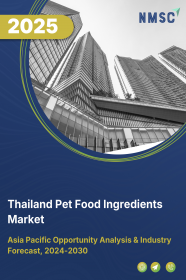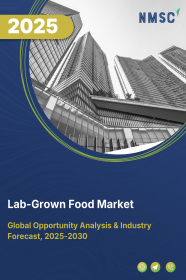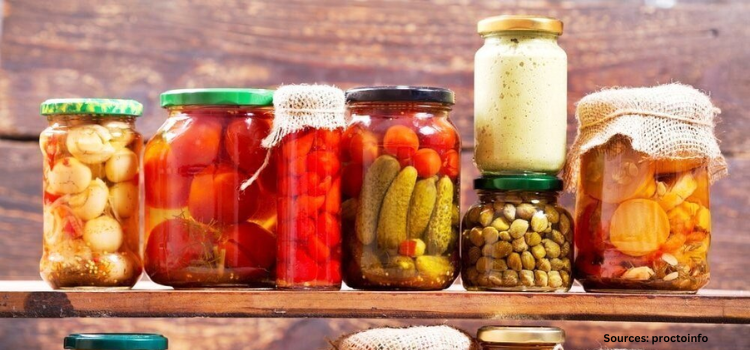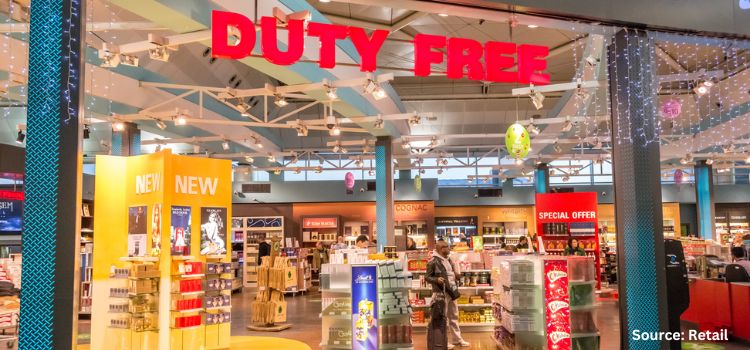
Thailand Pet Food Ingredients Market by Type (Non-Vegan, Vegan, and Novel Proteins), by Nature (Organic and Inorganic), by Form (Dry and Wet), by Pet Type (Dog, Cat, and Others), and by Distribution Channel (Online and Offline) – Opportunity Analysis and Industry Forecast, 2024–2030
Industry: Retail and Consumer | Publish Date: 16-Apr-2025 | No of Pages: 117 | No. of Tables: 85 | No. of Figures: 50 | Format: PDF | Report Code : RC2843
US Tariff Impact on Thailand Pet Food Ingredients Market
Trump Tariffs Are Reshaping Global Business
Thailand Pet Food Ingredients Market Overview
The Thailand Pet Food Ingredients Market size was valued at USD 638.17 million in 2023, and is predicted to reach USD 1561.45 million by 2030, at a CAGR of 13.1% from 2024 to 2030. In terms of volume the market size was 160.46 kilotons in 2023 and is projected to reach 315.80 kilotons in 2030, with a CAGR of 9.7% from 2024 to 2030.
The pet food ingredients market refers to the production and distribution of essential raw materials that are used in pet food formulations to fulfill the nutritional demands of various animals. These ingredients including proteins, fats, carbohydrates, vitamins, and minerals, come from both plant and animal sources.
Processing methods such as grinding and blending are employed to enhance both the flavour and nutritional value of the final pet food products. By focusing on high-grade ingredients, manufacturers are able to support the health of pets and meet the dietary needs of those with specific requirements. The companies within the industry focus on obtaining premium ingredients and ensuring transparency across their supply chains, leading to improved product quality and addresses consumer confidence. This approach helps the market grow as pet owners continue to prioritize superior food choices for their pets.
Rising Pet Ownership Drives the Thailand Pet Food Ingredients Market
The increasing pet ownership fuels the demand for premium ingredients in pet food as owners prioritize better nutrition for their pets. This trend drives growth and innovation within the pet food ingredients market, prompting suppliers to adjust to evolving consumer preferences for healthier and more sustainable options.
As per the reports published by the World Animal Foundation, dog ownership in Thailand reached approximately 47%, while cat ownership accounted for about 42% in 2023. The surge in pet ownership across the country has resulted in an increasing demand for protein-rich ingredients including chicken and beef in pet food, as owners focus on providing optimal nutrition and supporting their pets' overall health.
Expansion in Expenditure on Pets Boosts the Growth of the Market
The rising expenditure on pets drives the demand for premium pet food, as owners are more willing to invest in high-quality nutrition for their animals. This shift towards premium products propels the growth of the market, prompting manufacturers to source superior ingredients that address to the expectations of health-conscious consumers.
According to report published by the International Trade Administration (ITA), pet owners in Thailand spend an average of USD 300 to USD 600 annually per pet. This increasing pet-related expenditures in the country is fuels the demand for premium-quality pet food, leading to a stronger focus on sourcing high quality ingredients and creating innovative formulations that meet the needs of owners seeking optimal nutrition for their pets.
Supply Chain Challenges Restraints the Thailand’s Pet Food Ingredients Market Growth
The supply chain challenges including disruptions in logistics, transportation delays, and raw material shortages, hinders the timely delivery of essential ingredients, thus slowing the growth of the market. These issues make it difficult for manufacturers to maintain consistent production schedules and meet rising consumer demand.
The delays in ingredient procurement not only slowdown the production but also increase operational costs and thereby, companies are forced to seek alternative suppliers or materials. As a result, manufacturers face difficulties in maintaining product quality and consistency, further restraining market expansion efforts.
Adoption of Sustainable Protein Sources Creates Growth Opportunity for the Market
The transition to sustainable protein sources such as egg-derived proteins, tofu byproducts, black soldier flies, and silkworms is expected to create new opportunities in the pet food ingredient market. These alternatives are increasingly recognized for their rich nutritional content and lower environmental impact when set against traditional proteins including beef and pork.
Egg proteins and tofu derivatives provide nutrients and helps to reduce food waste. Moreover, insect proteins from black soldier flies and silkworms provide an organic and environmentally friendly method of protein production. These sustainable options not only fulfill pets’ dietary requirements but also support the adoption of sustainable practices, encouraging the industry towards environmentally responsible production and long-term sustainability.
Competitive Landscape
The several market players operating in the Thailand pet food ingredients market include Cargill Incorporated, BASF SE, Archer Daniels Midland Company (ADM), Koninklijke DSM N.V., Kemin Industries Inc., Symrise AG, Nutrix Public Company Limited, The Scoular Company, Thai Union Ltd., Chotiwat Manufacturing Public Company Limited, and others.
Thailand Pet Food Ingredients Market Key Segments
By Type
-
Non-Vegan
-
Beef
-
Chicken
-
Fish
-
Others
-
-
Vegan
-
Soyabeans
-
Peas
-
Lentils
-
Others
-
-
Novel Proteins
By Nature
-
Organic
-
Inorganic
By Form
-
Dry
-
Wet
By Pet Type
-
Dog
-
Cat
-
Others
By Distribution Channel
-
Online
-
Offline
Key Players
-
Cargill Incorporated
-
BASF SE
-
Archer Daniels Midland Company (ADM)
-
Koninklijke DSM N.V.
-
Kemin Industries Inc.
-
Symrise AG
-
Nutrix Public Company Limited
-
The Scoular Company
-
Thai Union Ltd.
-
Chotiwat Manufacturing Public Company Limited
REPORT SCOPE AND SEGMENTATION:
|
Parameters |
Details |
|
Market Size in 2023 |
USD 638.17 Million |
|
Revenue Forecast in 2030 |
USD 1561.45 Million |
|
Growth Rate |
CAGR of 13.1% from 2024 to 2030 |
|
Market Volume in 2023 |
160.46 Kilotons |
|
Volume Forecast in 2030 |
315.80 Kilotons |
|
Growth Rate (Volume) |
CAGR of 9.7% from 2024 to 2030 |
|
Analysis Period |
2023–2030 |
|
Base Year Considered |
2024 |
|
Forecast Period |
2024–2030 |
|
Market Size Estimation |
Million (USD) |
|
Growth Factors |
|
|
Companies Profiled |
10 |
|
Market Share |
Available for 10 companies |
|
Customization Scope |
Free customization (equivalent up to 80 working hours of analysts) after purchase. Addition or alteration to country, regional, and segment scope. |
|
Pricing and Purchase Options |
Avail customized purchase options to meet your exact research needs. |

















 Speak to Our Analyst
Speak to Our Analyst





















